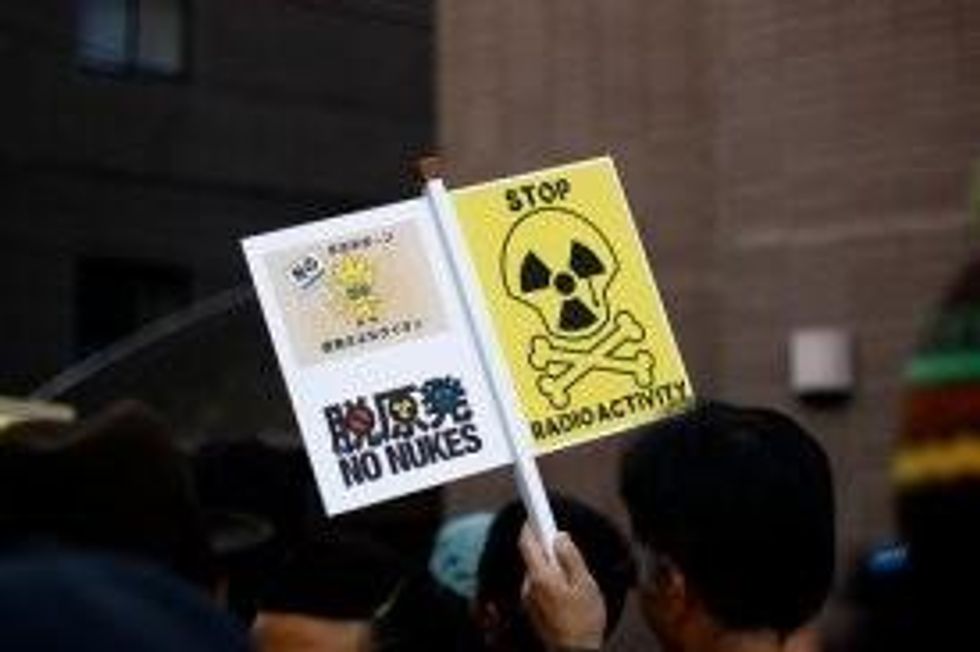Bird Population in Collapse Near Fukushima
Study: Many species show “dramatically” elevated DNA mutation rates, developmental abnormalities and extinctions
An upcoming study shows the future for birds and insect life around Fukushima has been badly damaged, an ominous sign of things to come.
The study, set to be published next week in Environmental Pollution, looked at 14 species of birds common to Fukushima and Chernobyl. David McNeill writes in the Irish Times:
Researchers working in the irradiated zone around the disabled Fukushima nuclear plant say bird populations there have begun to dwindle, in what may be a chilling harbinger of the impact of radioactive fallout on local life.
In the first major study on the impact of the world's worst nuclear crisis in 25 years, the researchers from Japan, the US and Denmark say that analysis of 14 species of birds common to Fukushima and Chernobyl shows the effect on numbers is worse in the Japanese disaster zone. [..]
Timothy Mousseau and Anders Pape Moller say their research there uncovered major negative effects among the local bird population, including reductions in longevity, male fertility and birds with smaller brains.
Many species show "dramatically" elevated DNA mutation rates, developmental abnormalities and extinctions, they add, while insect life has been significantly reduced.
* * *
Japanese researchers began studying flora and fauna around Fukushima in November, with an initial report on the findings expected in March.
* * *
In this video uploaded to YouTube in June, a bird near the Fukushima Prefecture exhibits abnormal behavior:
An Urgent Message From Our Co-Founder
Dear Common Dreams reader, The U.S. is on a fast track to authoritarianism like nothing I've ever seen. Meanwhile, corporate news outlets are utterly capitulating to Trump, twisting their coverage to avoid drawing his ire while lining up to stuff cash in his pockets. That's why I believe that Common Dreams is doing the best and most consequential reporting that we've ever done. Our small but mighty team is a progressive reporting powerhouse, covering the news every day that the corporate media never will. Our mission has always been simple: To inform. To inspire. And to ignite change for the common good. Now here's the key piece that I want all our readers to understand: None of this would be possible without your financial support. That's not just some fundraising cliche. It's the absolute and literal truth. We don't accept corporate advertising and never will. We don't have a paywall because we don't think people should be blocked from critical news based on their ability to pay. Everything we do is funded by the donations of readers like you. Will you donate now to help power the nonprofit, independent reporting of Common Dreams? Thank you for being a vital member of our community. Together, we can keep independent journalism alive when it’s needed most. - Craig Brown, Co-founder |
An upcoming study shows the future for birds and insect life around Fukushima has been badly damaged, an ominous sign of things to come.
The study, set to be published next week in Environmental Pollution, looked at 14 species of birds common to Fukushima and Chernobyl. David McNeill writes in the Irish Times:
Researchers working in the irradiated zone around the disabled Fukushima nuclear plant say bird populations there have begun to dwindle, in what may be a chilling harbinger of the impact of radioactive fallout on local life.
In the first major study on the impact of the world's worst nuclear crisis in 25 years, the researchers from Japan, the US and Denmark say that analysis of 14 species of birds common to Fukushima and Chernobyl shows the effect on numbers is worse in the Japanese disaster zone. [..]
Timothy Mousseau and Anders Pape Moller say their research there uncovered major negative effects among the local bird population, including reductions in longevity, male fertility and birds with smaller brains.
Many species show "dramatically" elevated DNA mutation rates, developmental abnormalities and extinctions, they add, while insect life has been significantly reduced.
* * *
Japanese researchers began studying flora and fauna around Fukushima in November, with an initial report on the findings expected in March.
* * *
In this video uploaded to YouTube in June, a bird near the Fukushima Prefecture exhibits abnormal behavior:
An upcoming study shows the future for birds and insect life around Fukushima has been badly damaged, an ominous sign of things to come.
The study, set to be published next week in Environmental Pollution, looked at 14 species of birds common to Fukushima and Chernobyl. David McNeill writes in the Irish Times:
Researchers working in the irradiated zone around the disabled Fukushima nuclear plant say bird populations there have begun to dwindle, in what may be a chilling harbinger of the impact of radioactive fallout on local life.
In the first major study on the impact of the world's worst nuclear crisis in 25 years, the researchers from Japan, the US and Denmark say that analysis of 14 species of birds common to Fukushima and Chernobyl shows the effect on numbers is worse in the Japanese disaster zone. [..]
Timothy Mousseau and Anders Pape Moller say their research there uncovered major negative effects among the local bird population, including reductions in longevity, male fertility and birds with smaller brains.
Many species show "dramatically" elevated DNA mutation rates, developmental abnormalities and extinctions, they add, while insect life has been significantly reduced.
* * *
Japanese researchers began studying flora and fauna around Fukushima in November, with an initial report on the findings expected in March.
* * *
In this video uploaded to YouTube in June, a bird near the Fukushima Prefecture exhibits abnormal behavior:


